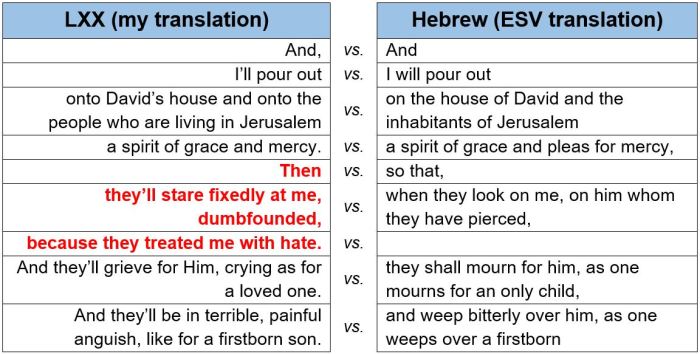One is not like the other ...
Image

The Septuagint (“LXX”) is the Greek translation of the Old Testament, dating to sometime in the mid to early 2nd century B.C. It came about because many Jews living abroad, particularly in Egypt, had lost much of their ability to read and speak Hebrew. They need a translation of the Tanakh (the Hebrew Scriptures) in their own language. The Mediterranean culture was heavily influenced by Hellenism at this time; a legacy of Alexander the Great’s conquests. So, the Hebrew Scriptures were translated into Greek.
This Greek version of the Tanakh was the version Jesus and the apostles used. The majority (but not all) of their Old Testament citations are from the Septuagint. This means the Septuagint is important.
I’m preaching from Zechariah 12:1 - 13:1 next week, as our congregation celebrates the Lord’s Supper. This passage contains the famous prophesy about the Israelites looking to Jesus, whom they pierced (Zech 12:10). This “piercing” clearly refers to Jesus’ death, and echoes an earlier prophet, Isaiah (“but He was pierced for our transgressions; He was crushed for our iniquities …” Isa 53:5). But, there’s an interesting problem. The LXX is different from the Hebrew!
One of these is not like the other
Here is the difference between the two:

To be sure, there are a lot of similarities. Both have a transition statement (“and”) to let the reader know a new, related subject is coming. Both have Yahweh declaring that He’ll “pour out” onto David’s house and those who are living in Jerusalem a spirit characterized by grace and mercy. These are things that describe this spirit; it’s merciful and full of grace.
But, here is the difference. The Hebrew clearly has a reference to someone whom the Israelites pierced. They’ll look at Yahweh, who they pierced, and they’ll be ashamed. This isn’t in dispute. Look at some other English translations:
- KJV: “they shall look upon me whom they have pierced …”
- RSV: “when they look on Him whom they have pierced …”
- NASB: “they will look on me whom they have pierced …”
- NET: “they will look to me, the one they have pierced …”
- NIV: “they will look on me, the one they have pierced …”
- NKJV: “they will look on me whom they have pierced …”
- NLT: “they will look on me whom they have pierced …”
What does the LXX say? It says this:
Then they’ll stare fixedly at me, dumbfounded, because they treated me with hate.
The “look upon” part is still there; I just translated it in a more colloquial fashion (“stare fixedly at me, dumbfounded”). It’s the second part that’s different. The LXX says the Israelites will be astonished because they treated Yahweh with so much hate. How did they do this? Well, presumably, they treated Him with hate (or, despitefully) by rejecting Him for so long … until they didn’t. The rest of the verse clarifies:
And they’ll grieve for Him, crying as for a loved one. And they’ll be in terrible, painful anguish, like for a firstborn son.
Because they treated Yahweh with so much hate, they’ll grieve for Him. You could translate the pronoun as it, but only if you believe the antecedent is an impersonal object, like the hateful treatment. But, if that were the case, the rest of the verse wouldn’t make too much sense. How can you mourn and grieve for an impersonal object like you would for a loved one, or even a firstborn son? The New English Translation of the Septuagint agrees, and so did Brenton’s translation. The Lexham English Septuagint, however, goes with “it,” but this deliberately a very literal translation.
The best way to understand this is as a third-person, personal pronoun (Him). But, who? Yahweh is talking in the first-person about Himself, but then shifts to third-person and says the Israelites will mourn for Him. This person is Jesus, who the Jews will turn to in the last days when the Spirit is poured out upon them, to convert them to the New Covenant.
Why the change?
The Greek text was clearly changed. The translators messed with it. The Hebrew reads “pierced,” and the Jews who did the translation altered it on purpose. They changed it to read “because they treated me with hate.” Why did they do it? Maybe because they didn’t like what it said. How can someone “pierce” God? How does that even work? So, they changed it.
But do we know they being deliberately malicious? Not really! Perhaps it was more convenient to take this “piercing” in a more figurative sense. You know that feeling you get when someone you care about betrays you in an awful fashion? Isn’t it like having a stake driven right through your heart? Perhaps God felt that way when the Israelites hated Him, so this “piercing” was more metaphorical and poetic. In a colloquial way, the Israelites “cut God really deep” with their actions. Maybe that’s how they justified the change.
“Here, now,” they might have thought, “this is getting to the idea of being treated with malice and hate, so let’s just spell it out plainly, and drop the ‘piercing’ imagery!”
In a parallel way, the NET did a similar thing when it rendered Deuteronomy 10:16. See a comparison:
- NET: Therefore, cleanse your heart and stop being so stubborn!
- ESV: Circumcise therefore the foreskin of your heart, and be no longer stubborn.
The more literal rendering is to “circumcise” your heart. The NET decided that was too literal, and tried to get to the heart of the phrase by dropping the figurative imagery. That’s not necessarily a problem … unless you’re wrong about what that figurative imagery means!
In this case, assuming I’m right about why the LXX translators changed it, they were certainly wrong about what the imagery meant. It wasn’t imagery at all; Jesus literally was pierced (i.e. died). Am I right about the reason for the change? I’ve no idea. Nobody knows why it was changed, so I might as well speculate right along with the commentators. Their guess is as good as mine. When a good textual critical commentary on the LXX of Zechariah comes out, then maybe we’ll have a more informed opinion! After all, there is no monolithic “one Septuagint.” There are many versions of the Septuagint floating around!
Bottom line
The LXX is neat. The LXX is helpful. The LXX is necessary. If you’re a pastor, and you took two years of Greek, you can muddle your way through the LXX. If you took more than the two years of Greek, you can stumble your way through it, like I do. The LXX of Zechariah 12:10 is different, but it still conveys the same essential meaning. There are two people in the verse; Yahweh and the Person the Israelites will mourn for when they come to faith. This verse is a small snapshot of our triune God.
Tyler Robbins 2016 v2
Tyler Robbins is a bi-vocational pastor at Sleater Kinney Road Baptist Church, in Olympia WA. He also works in State government. He blogs as the Eccentric Fundamentalist.
- 350 views
The Logos LXX has the Greek as …”καὶ ἐπιβλέψονται πρός με ἀνθʼ ὧν κατωρχήσαντο.” κατωρχήσαντο generally means to reproach or to taunt. I guess I can get to, “they treated me with hate,” from that.
They have “treat despitefully” or something like “dancing for joy.” I’m at work, and can’t remember precisely what it was. The point is a malicious attitude. I confess my translation was quite dynamic!
Tyler is a pastor in Olympia, WA and works in State government.
Interestingly, in Appian’s Foreign Wars, the word is translated into English as “made insulting gestures.” In Herodotus’ Histories, the word is translated as “taunted … with gestures.”
I didn’t have time to do a word study through the LXX, but maybe I will …
Tyler is a pastor in Olympia, WA and works in State government.
That word is only used once in the LXX … in the passage under discussion. That is why I referenced other Greek literature.
What may be a profitable study would be to trace how the Hebrew word דקר is translated in the LXX. That may provide additional insight into why the LXX translators chose this specific Greek word in Zech 12:10.
Tyler,
Why not just go back and do your own translation from the Hebrew? That’s the definitive source. I’ve never done any translation for public use, but I’ve done a lot of it in personal study of the text for ministry preparation. There are translation issues that must be confronted when working from a source language to a receptor language.
I haven’t taken Hebrew classes yet; it’s all I have left … This self-assigned project was more about me keeping up my Greek, than investigating anything intriguing in the LXX. I didn’t know there was a difference until I started working on it.
Tyler is a pastor in Olympia, WA and works in State government.
Tyler,
I just did a quick, first-steps, study of “pierced.” The “bottom line” is that it means “pierce.” This passage not only prophesies the death of Christ, but something of the manner in which it was carried out. The word appears in Zechariah 12:10 and also in 13:3. It is what happened to the Hebrew man and Midianite woman in Numbers 25:6-9. When the word is used in that way throughout OT literature, you are hard pressed to change it in Zechariah.
This is just another reason I am cautious in using the NIV. The men who worked on it took liberties like this with the original languages in too many places. They did outstanding work in producing a readable English document, but they often interpret as much as translate. I’m far from alone in this assessment. Others have written on that subject.
I just did a quick, first-steps, study of “pierced.” The “bottom line” is that it means “pierce.” … This is just another reason I am cautious in using the NIV.\
What does the NIV have to do with this?
My point is the LXX doesn’t match the Hebrew. That’s it. The LXX doesn’t have “pierced.” The NIV, like all translations, has strengths and weaknesses!
Tyler is a pastor in Olympia, WA and works in State government.






Discussion